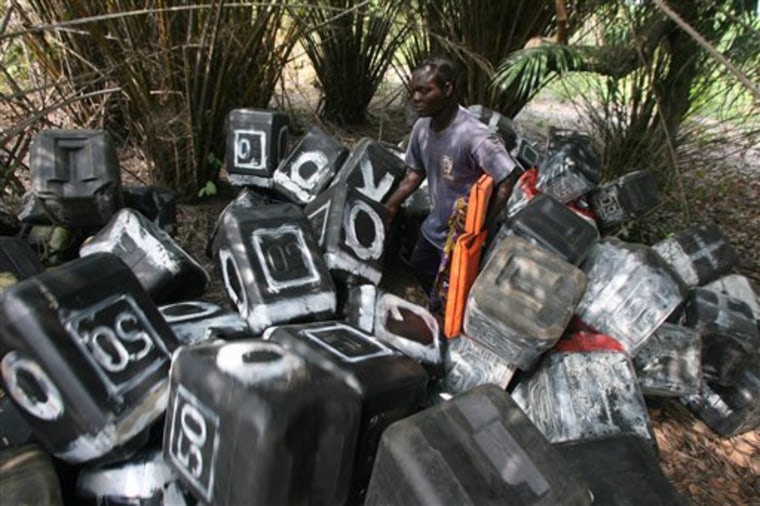A ruptured gasoline pipeline exploded in flames, killing at least 34 people near Nigeria's main city of Lagos as they tried to scoop fuel from the gushing leak, police said Wednesday.
The government blamed criminal gangs breaking into pipelines.
The explosion, on a line that carries imported gasoline from the Lagos port to inland depots, occurred Tuesday morning at Igbagbon, a village near Lagos. It was a stretch of pipeline in remote swamp waters, and news of the fire only filtered out Wednesday morning.
A charred swathe of bush littered with hundreds of burned and unburned jerry cans and buckets was all that remained of the disaster site on Wednesday after firefighters put out the blaze and engineers clamped the rupture.
Lagos police spokesman Frank Mbah told reporters officers counted 34 bodies at the scene.
Twenty-eight bodies burnt beyond recognition were buried in a mass grave near the site by Red Cross volunteers, said Abiodun Orebiyi, secretary of the Nigerian Red Cross. Orebiyi said the final toll may never be known, since local people who arrived the scene earlier had also buried some of the dead.
"There were more than 40 bodies when we first got here," said Ganiyu Odukale, a resident of the Igbagbon fishing community closest to disaster location, who said he was among the first at the scene on Tuesday.
Searching for burned women, children
Red Cross officials said they were now focusing efforts on searching for injured people who have gone into hiding because they had been engaged in an illegal activity.
"Many have fled deeper into their villages afraid they may be arrested," said Orebiyi. "We're sending volunteers into the villages to persuade them to come for treatment."
Most of the victims were women and children who had crowded at the scene with jerry cans and buckets in the hope of collecting fuel for sale or personal use.
Despite its oil riches, the vast majority of Nigerians remain impoverished, living on less than $1 a day, tempted by the opportunities to obtain free fuel in spite of the dangers.
President Umaru Yar'Adua's government said in a statement it was shocked and saddened by the disaster, blaming it on criminal gangs breaking into pipelines. The government pledged to tighten security around the pipeline network, urging citizens to be vigilant and report criminals targeting the pipelines to the security agencies.
More than 400 people died in two similar pipeline explosions in Lagos in 2006. Authorities say criminals siphon fuel for sale, attracting crowds of people who come in their wake to scavenge for fuel.
